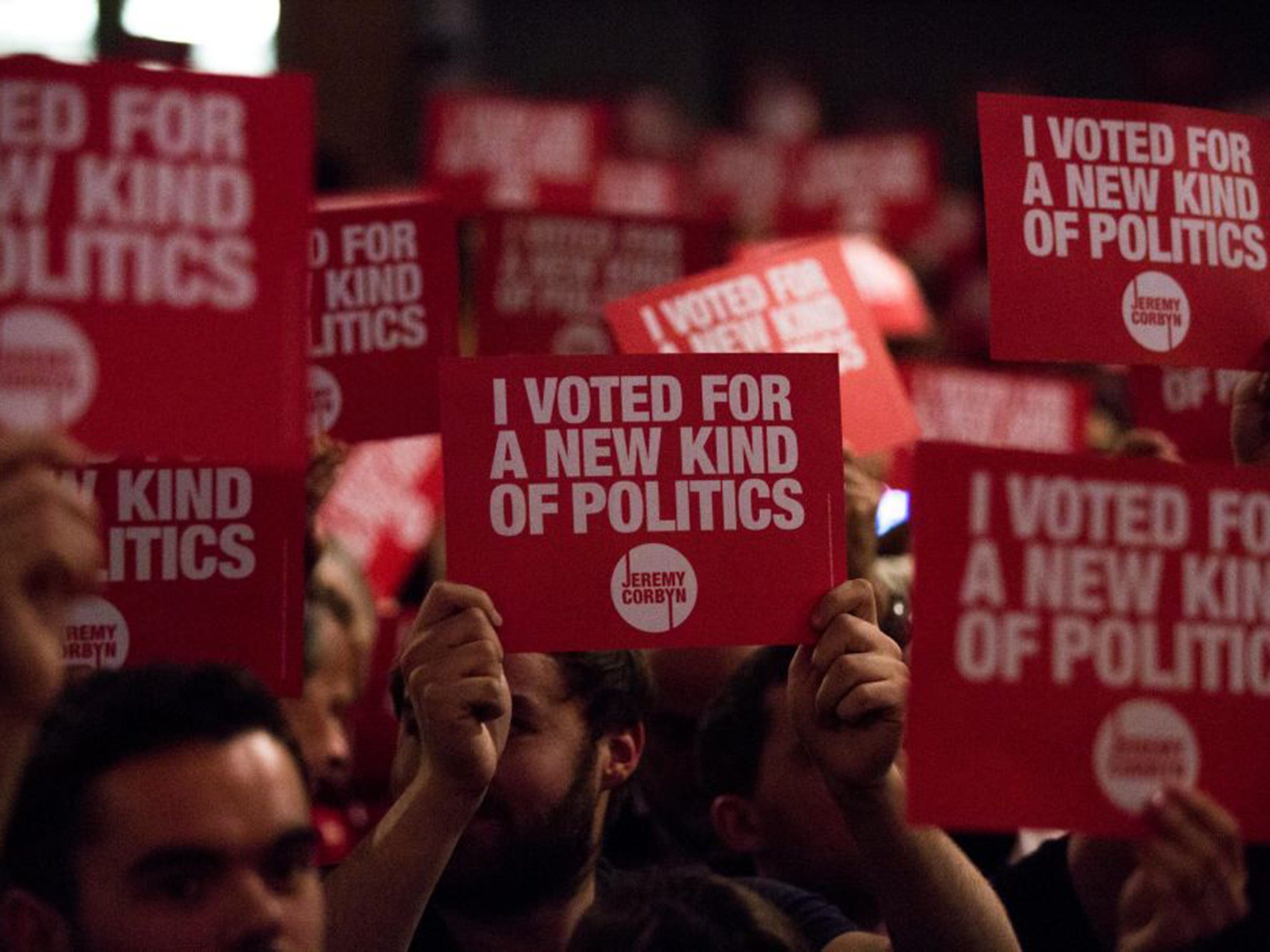Jeremy Corbyn’s supporters are celebrating, not gloating. They want a united party more than ever
‘Corbyn’s a better person than I am,’ a lecturer at the Momentum conference told me. ‘I mean, we could learn from him reaching out. We’re all a family. That’s democracy – you have disagreements and you come together.’

Your support helps us to tell the story
From reproductive rights to climate change to Big Tech, The Independent is on the ground when the story is developing. Whether it's investigating the financials of Elon Musk's pro-Trump PAC or producing our latest documentary, 'The A Word', which shines a light on the American women fighting for reproductive rights, we know how important it is to parse out the facts from the messaging.
At such a critical moment in US history, we need reporters on the ground. Your donation allows us to keep sending journalists to speak to both sides of the story.
The Independent is trusted by Americans across the entire political spectrum. And unlike many other quality news outlets, we choose not to lock Americans out of our reporting and analysis with paywalls. We believe quality journalism should be available to everyone, paid for by those who can afford it.
Your support makes all the difference.The prevailing mood in the banner-decked hall at Momentum’s fringe conference in Liverpool this weekend was quietly confident. Watching the BBC live stream as the result of the Labour leadership contest was announced, the crowd mischievously heckled over a compilation of Owen Smith interviews. With the finish line in sight, it seemed laughable that the Labour MP for Pontypridd ever hoped to win against Corbyn on a left-wing ticket while dragging a voting record and career history behind him that suggested he was anything but.
Yet, when the votes came in, the inevitability of Corbyn’s win did not dilute the celebration of his renewed 61.8 per cent mandate. The hall shook as the crowd stomped their feet and chanted his name; one woman burst into a little victory dance.
Absent from the celebrations, however, were calls of a permanent revolution or stirring notes from L’Internationale. I had kept a keen eye on the Liverpool Socialist Singers group just in case. Indeed, there was little gloating to be had at all. Instead, members of Momentum – the grassroots campaign that has championed Corbyn’s leadership, but is unfairly dismissed by mainstream Labour MPs as “Trotskyist” – nodded along dutifully, cheering as the re-elected leader stated that he and his opponent Smith were still part of the “same Labour family”.
“Remember that, in our party, we have much more in common than that which divides us. As far as I’m concerned the slate is wiped clean from today,” said the newly-invigorated Labour leader. Corbyn also called for an end to the abuse that “demeaned and corroded the party.”
Those around me said the same. Oliver, a 28-year-old manufacturer who travelled from Oxfordshire to be present for the leadership result, said: “MPs now have to take notice and respect his mandate. Now we can finally put it to bed.”
“Corbyn’s a better person than I am,” said Karen, a 52-year-old lecturer in business at Liverpool university. “I mean, we could learn from him reaching out. We’re all a family. That’s democracy – you have disagreements and you come together.”
Corbyn rightly used his victory speech to shift the conversation away from the navel-gazing that has dogged his party for the past 12 months and onto policy issues that Labour MPs can unite behind. He addressed the need for a functioning NHS; better care for the elderly; reduction in child poverty; the reduction of inequality.
The real rallying call for party unity, however, came in his attack on Theresa May’s grammar schools expansion plan. “I am calling on Labour party members to join us in a national campaign for inclusive education for all next Saturday,” said Corbyn. On this point, even deputy leader Tom Watson, agrees; it’s a lodestar to guide members and parliamentarians on the path back to unity.
The one flat note in the new Labour tune: Corbyn’s stance on migration. He repeated, to the admiration of many, his consistent belief that the UK has a “duty as a country to refugees”. I agree, but many MPs see such a comment as electoral suicide in a country that voted against immigration in a proxy vote on the policy at the EU referendum. How, they will ask, can a pro-migrant party ever hope to win back support in Labour heartlands which voted for Brexit?
But despite his calls for immigration controls in 2015, Ed Miliband still lost to the Conservatives. If Labour can find a united response that addresses both the concerns of Brexiteers and our moral duty to the migration crisis, there may be electoral success to be had yet.
Call me idealistic – Corbyn supporters have heard far worse in recent months – but with the leadership election behind us and the result conclusive, there is now enough time before the 2020 general election is called for an energised, refreshed Labour Party to change the terms of political debate in post-Brexit Britain. If Labour can reclaim its reputation for compassion from Theresa May’s Conservatives, it may be in with a chance.
Jeremy Corbyn has made a start, showing humility and grace to his detractors. Let’s hope it is returned in kind.
Join our commenting forum
Join thought-provoking conversations, follow other Independent readers and see their replies
Comments